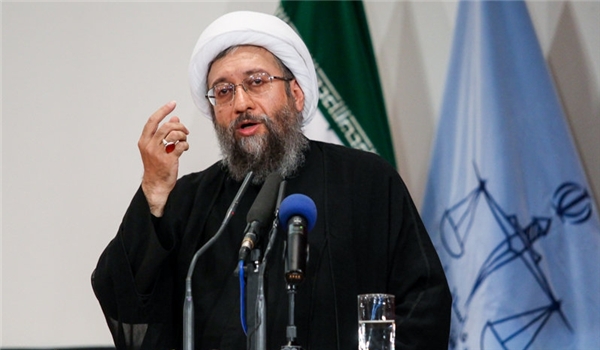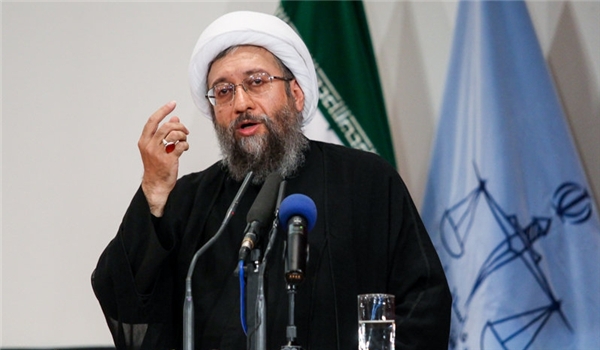 TEHRAN (FNA)- Iran's judiciary Chief Sadeq Amoli Larijani categorically dismissed the contents of a draft resolution sponsored by the Ottawa government and submitted to the UN Human Rights Committee against Tehran, saying that the draf contains repetition of the previous allegations to which Iran has provided well-documented responses.
TEHRAN (FNA)- Iran's judiciary Chief Sadeq Amoli Larijani categorically dismissed the contents of a draft resolution sponsored by the Ottawa government and submitted to the UN Human Rights Committee against Tehran, saying that the draf contains repetition of the previous allegations to which Iran has provided well-documented responses."The topics of the resolution are a repetition of the same issues that were brought up in previous reports of UN Secretary General Ban Ki-moon and the UN Special Rapporteur for Human Rights in Iran, Ahmad Shaheed," Amoli Larijani said on Wednesday.
Iran's judiciary chief expressed regret to see that the same allegations are repeated despite Iran's documented responses to the previous reports.
He pointed to the repeated allegations such as execution of underage convicts, and said, "Execution of under 18-year-old children is sheer lie."
He, meantime, thanked Secretary of Iran's Human Rights Council Mohammad Javad Larijani for providing well-documented responses to every clause of the same reports at the Universal Periodic Review (UPR) meeting of the UN, and said, "It is clear that the human rights allegations about Iran are the product of huge political work carried out by the western countries' media empire."
Canada has had a very bad track record of human rights and when it comes to the treatment of natives, most of the native Canadians suffer poor educational, economic and social conditions, and are among the poorest members of the Canadian society.
On December 21, 2012, the natives started demonstrations in Ottawa and several other cities to call for the protection of their rights. First Nations leaders denounced the policies of the Canadian government vis-�-vis the natives as oppressive.
Reports from Canada said that the natives underlined their intention to continue protests until the full restoration of their rights.
Last Wednesday, secretary of Iran's Human Rights Council� underlined that his country has always done its best to observe international human rights' rules and regulations.
Addressing the 20th session of the Human Rights Council's Universal Periodic Review Working Group in Geneva, Larijani underscored that Tehran is bound to its international obligations and would continue cooperation with the world body to enhance human rights standards in view of cultural diversity of different nations.
Larijani added that UPR working group is a good opportunity for the member states to present their policies in fields of human rights.
Earlier this month, the Iranian Human Rights chief rapped the West's double-standard policies and stances on human rights issues in Iran, asking the West how come it is concerned about the Baha'i minority sect in Iran but ignores the vitally negative impacts of its unfair sanctions on the majority of Iranians.
"I am astounded and have always been asking this question from myself why these (western) countries are not concerned about the majority of Iranians who are under their harshest inhumane sanctions to the same extent that they are concerned about this minority sect (Baha'ism)," Larijani said.
He added that Iranian university students have been deprived of their right to continue their studies in the same countries that claim to be supporters of Baha'ism and human rights for no good reason.
"These countries are constantly referring to this sect as a religious minority and they are trying to inspire that the Baha'is are living under difficult conditions while the Islamic Republic of Iran treats Baha'is like other citizens and they enjoy citizens rights," the secretary of Iran's Human Rights Council said.
Although members of the Baha�i sect have admitted to their crimes in various cases, the West, specially the United States, claims that Iran has violated their human rights due to its attempts to stop the illegal activities of the cult.
"We (as the state) offer a variety of services to the Baha�i sect in Iran and respect them as human beings, but not as insiders, spies, or a political grouplet supported by Britain and Israel to cause disturbance in Iran," Iran's former Prosecutor General Qorban-Ali Dorri-Najafabadi said in 2009.
According to Dorri-Najafabadi, there is irrefutable evidence that many adherents of the Baha�i sect are in close contact with the enemies of the Iranian nation and have strong links to the Zionist regime.
"We have always showed great kindness to the Baha�i citizens in Iran. We just oppose such relations," Dorri-Najafabadi explained.
By Fars News Agency
The Iran Project is not responsible for the content of quoted articles.











